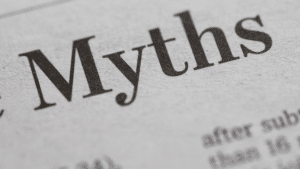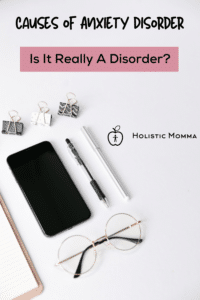What Is Anxiety Disorder? Exactly What You Need To Know
Ordinarily, anxiety is how your brain reacts to stress. Unlike what most people think about it, anxiety could be beneficial in some situations. It helps to alert you of possible danger and helps you stay focused. However, if you are among those asking the question “is anxiety a disorder?” You will find this article helpful.
As human beings, we feel anxious every now and then. For instance, it’s normal to feel worried when you have looming deadlines, or you want to make an important decision. But anxiety becomes a disorder when you have constant and overwhelming fears.
When anxiety becomes a disorder, you may find yourself avoiding school, family get-together, and other social events that could trigger it. Different studies have confirmed that anxiety disorders are the most common type of mental disorder. It affects about 30% of adults at some points in their life.
Guess what? Even though anxiety is a disorder, it’s treatable and has several treatment options. With the right treatment option, an anxiety patient can lead a normal productive life again.
In a nutshell, it’s normal for your brain to react to stress or alert you of possible danger. But when fear becomes a recurring thing, it becomes a disorder.
Table of Contents
Types of Anxiety Disorder
Here are the different types of anxiety disorder:
Generalized Anxiety Disorder
Generalized anxiety occurs when you constantly have overwhelming fear or worry that affects your day to day activities. Sometimes, generalized anxiety comes with symptoms like restlessness, lack of concentration, feeling on the edge, insomnia, et.
Again, generalized anxiety’s fears are usually about everyday affairs like appointments, car repairs, job-related issues, family health, etc.
Panic Disorder
Panic disorder is a more severe type of disorder that involves a combination of physical and psychological distress. If you are experiencing a panic disorder, you may experience the following symptoms simultaneously;
- Rapid heart rate
- Trembling or shaking
- Smothering sensation
- Chest pain
- Lightheaded
- Fear of losing control
- Fear of dying, etc.
Due to the severeness of panic disorder symptoms, people often believe they are having a heart attack whenever they experience them.
Specific Phobia
Specific phobia is a type of anxiety disorder that occurs when you have an excessive and persistent fear of a particular activity, situation, object, or animal. Of course, specific phobia isn’t a harmful disorder.
In a specific phobia, the patients know they have an excessive fear about a particular thing, but can’t do anything to stop it. Surprisingly, these fears could cause serious distress, and patients can go extra miles to avoid them.
A good example of specific phobia is the fear of cockroaches (katsaridaphobia), the fear of fly (aviophobia), the fear of spiders, etc.
Agoraphobia
When you have agoraphobia, it means you have an uncontrolled fear of places or situations that make you feel panic, trapped, helpless, and embarrassed. This disorder could last for about 6 months. And if you fail to allay your fears, it could affect your daily activities.
Again, if you allow this anxiety disorder to linger for a while, you may not be able to leave your home.
Social Anxiety Disorder
Social anxiety disorder is a type of disorder in which you have an excessive fear of being embarrassed, rejected, humiliated, or looked down on in social interaction or gathering.
So, if you have an overwhelming fear of speaking in public, meeting new people, or eating in public places, you are suffering from a social anxiety disorder.
Separation Anxiety Disorder
Separation anxiety occurs when you have an excessive fear of separating from people you are attached to. This disorder can last for four weeks or more in children and about six weeks in adults.
Whenever you start worrying excessively about losing someone you love or care about, it’s an indication that you have a separation anxiety disorder. Some of the symptoms of this disorder are; insomnia, nightmares about separating from people you love, etc.
Causes of Anxiety Disorder
It’s a bit challenging to point out the exact causes of anxiety disorder. Several factors may be responsible for it. For instance, if you are prone to anxiety, traumatic life experience could trigger it. Similarly, it’s possible to inherit an anxiety disorder.
Medical Causes of Anxiety
Underlying health conditions cause some anxiety disorders. There are instances when signs and symptoms of anxiety disorders are an indication of a medical condition. Here is a list of medical conditions that could cause anxiety;
- Heart disease
- Diabetes
- Thyroid related condition like hyperthyroidism
- A respiratory disorder like asthma
- Misuse or withdrawal of certain drugs could cause anxiety
- Sudden withdrawal from alcohol or anti-anxiety drugs like benzodiazepines
- Chronic pain
- Certain types of tumors that produce some fight or flight hormones.
Complications of Anxiety Disorder
Once you feel that you have an anxiety disorder, it’s important to get treatment. Otherwise, it could lead to worse mental conditions. Here are some complications of untreated anxiety disorder;
- Depression
- Misuse of substance
- Insomnia
- Digestive or bowel related issues
- Social isolation
- Underproductive at work or in the school
- Suicide
Helpful Articles You Will Want to Read:
- Dealing With Anxiety: Here’s The Right Way to Do It
- Anxiety Attack vs. Panic Attack: What is the difference?
- What Anxiety Causes: The Silent Killer

Misconceptions about Anxiety
There are several misconceptions about anxiety disorder out there. Here are some of them;
Anxiety is a Sign of Weakness
Unlike what people think, anxiety isn’t a sign of weakness. It can happen to anybody irrespective of your age and walk of like.
It’s important to have a change of mindset about this misconception that anxiety is a sign of weakness. Sadly, this will make people dealing with anxiety find it difficult to seek help from others.
You can Easily Cure Anxiety Disorder When You Ignore the Voice on Your Head.
This is not true. Of course, you may be able to avoid basic worries when you stop listening to the voices on your head. But if you are suffering from true anxiety, the worries will always come back and be more intense.
Sometimes, when you try to suppress bad thoughts from your head, you end up reigniting them. So, if you want to have a better quality of life, it’s advisable to treat your anxiety disorder. It doesn’t matter how mild it is, confront it head-on.
Getting Help For Anxiety Will Make People Think You are Crazy
Most people suffering from anxiety disorder usually don’t seek help. This is because they believe that people will think they’re crazy.
Far from it, getting anxiety’s help doesn’t make you a crazy person. Once you start developing the fear of what people will think about you, you could lose your balance and well being.
There are things you can do at home such as getting a home gym so you can workout from the comfort of your home.
Panic Attack Will Make You Lose Control
Another common misconception about an anxiety disorder is that you are likely to pass out or lose control during a panic attack. This isn’t true; in fact, you are unlikely to faint during a panic attack. This is because it doesn’t cause your blood pressure to fall. Instead, it rises slightly.
Whenever You Have a Bad Thought, Snap a Rubber on Your Wrist
There’s no correlation between snapping a rubber on your wrist and your worries. Whenever you try to suppress your thoughts, they tend to be stronger and more frequent. So, if you want your thoughts to go away, don’t try to suppress them because whatever you try to resist persists.
Anxiety Disorder Patients Should Avoid Stress or Situation that Will Make Them Feel Stressed
This isn’t true. Anxiety disorder patients who always treat themselves fragile and avoid risk, tend to feel demoralized. Being anxious doesn’t prevent you from carrying out your day to day activities. It even makes your mind occupied with other things.
Anxiety’s Medications Are Addictive
Not all anxiety medications are addictive. For instance, SSRI and SNRI antidepressants aren’t addictive, and they are effective for managing anxiety disorders.
Similarly, benzodiazepine is a very effective anxiety medication when used for a short time. But if you use the drug for a prolonged period, it could be addictive.
Medication is the Only Treatment for Anxiety
Ordinarily, medication is an effective treatment for anxiety disorders. But there are other treatment options. For instance, cognitive-behavioral therapy (CBT) is a treatment option for anxiety. It’s very effective, and you can combine CBT and medication for a better result in the long run.
Some Anxiety Disorder Patients Are Worrywart, And You Can’t Help Them
There’s nobody that can’t be helped irrespective of how severe their disorders are. Once an anxiety patient undergoes therapy, it reduces their worries, suffering, and under a better way to relate with your thoughts without triggering fears or anxiety.
Originally posted 2020-07-27 19:58:28.
Megan Santiago
Latest posts by Megan Santiago (see all)
- How to break a Fever - March 10, 2024
- Porn Addiction Side Effects: How to Stop Now - January 3, 2024
- 5 Reasons You Need Vitamin C for Adrenal Fatigue+ Tips for Healing - January 3, 2024



